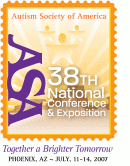 |
The ASA's 38th National Conference on Autism Spectrum Disorders (July 11-14, 2007) of ASAThe Westin Kierland Resort & Spa, Scottsdale, AZ |
| For a complete author index with session numbers, please click here | |
| Thursday, July 12, 2007: 1:15 PM-2:30 PM | |||
| Greenway A & B | |||
| #2538- Kiss My Asperger......Goodbye!: Building an Effective Employability and Social Support System that Works | |||
| This workshop provides the 10 strategies most needed for Transitional aged and adults with Asperger Disorder and the people who love them, to develop the leadership, advocay and resource skills necessary to enhance their social, community and employability lives.
Faced with a 10 year trend of more than 75% unemployment, it's time to re-assess how we transition people based, no longer on their deficit employability skills, but, rather focus on the social, communication and other strength-based skills that individuals with Asperger already bring to the table. This workshop explores proven methodologies and best practice models that are being utilized currently to build capacity, create lots of new jobs with sustainability and provide stress and anxiety reducing experiences in the community. The 10 strategies discussed in this presentation are based on the real experiences of individuals with Asperger who are working, living and participating in the community. Join them in learning strategies that help people with Asperger realize their hopes and dreams, supported by a nuturing family and community environment. | |||
| Presenter: | - Nationally renowned as an expert in the Asperger/Transitional Services arena, Dr. Fishbein's experiences have included: Special Needs Project Manager for the Children's Services Council of Broward County Florida, Executive Director of League School of Boston and the Vermont Achievement Center, Transition and Adult Services Coordinator for UM Center for Autism, Director of the Asperger Strategy Center, Board of Directors of ASA National, presenter at ASA, NAA, CEC, AWARE, and consultations to autism and developmental disability programs world-wide. | ||
|
| |||
|
Failure is just a way that says we are moving in the wrong direction...for many of us, it is a learning tool that allows us to benefit from our mistakes and move ahead. For many individuals with Asperger Syndrome, failure is something that can lead to "getting stuck (inertia)", depression, social isolation and lack of motivation. This interactive presentation (Music, PowerPoint, and Embedded video clips) is designed to instruct participants interested in Asperger Syndrome in a variety of key strategies necessary for survival in a neuro-typical world. Presented, like the unfolding of a book, the presentation is divided into chapter, each dealing with major issues confronting individuals with Asperger and their families, by identifying the issues and presenting workable solutions for smooth effective Transitions into community living, the workplace, and meaningful relationship building. Utilization of these recommended solution strategies, in the last two years, has resulted in over 100 individuals with Asperger Syndrome and related developmental disabilities being successfully placed in the workforce (supported and independent) in a variety of paid employment opportunities. Additionally, these individuals have shown a marked decrease in the amount of employability, social and community supports needed as evidenced on the SIS (Supports Intensity Scale), collected from pre and post test data. There are essentially 10 major "make or break" areas where individuals with Asperger need support. These areas include, dealing with confusing social situations, making "small talk", creative conversations, identifying levels of details, difficulty understanding other people's feelings and thoughts, the need to focus on more than one thing at a time, "social manners" (being perceived as insensitive, rude, or uncaring), dealing with strong topic fixations, dealing with repetitive, sometimes inflexible behaviors, difficulty making friends, and keeping a job. Each area is discussed and solutions are presented for consideration. Some of these solutions include: scripting skills for social situations; getting and keeping a job; Mixing play with pay (what is the right job and how do we find it?); The role of "eye" contact and "I" contact; How do we maximize our "Quirkiness" to our advantage?; The role of Life Skills Training; Using electronic self-monitoring effectively; "F" words: The good (fun, finance, friends, family and faith), and the bad (Flowers, Filth and Food, the Vocational stereotypes); Relationship Development Techniques, Learning how to pick and choose your battles; understanding the value of connections; social pragmatics...the new cure for what ails us; making informed choices and decisions, and time management techniques that are easy to use. Through a series of final exercises called, " Build, learn and understand your community", participants will develop a way of integrating these strategies into a "Personal Life Plan", which will allow for better self-understanding, self-advocacy and "mapping" the future and making it into reality. While the mystery of life will not be unlocked, the secrets behind the "musician's credo" will: "In Life, Don't B Too Flat; In Life, Don't B Too Sharp; In Life, Just B Natural".
|
|||
See more of General Submissions
See more of The ASA's 38th National Conference on Autism Spectrum Disorders (July 11-14, 2007)